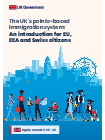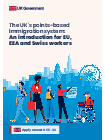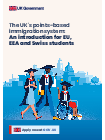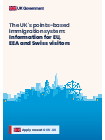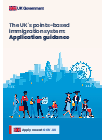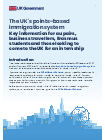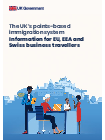The UK’s points-based immigration system: information for EU citizens
Information about the UK’s points-based immigration system for EU, EEA and Swiss citizens.
Find out about what you’ll need to do before you leave for the UK because of coronavirus (COVID-19).
Overview
The UK left the European Union on 31 January 2020. Free movement between the UK and the European Union ended on 31 December 2020 and on 1 January 2021, the UK implemented a points-based immigration system that prioritises skills and talent over where a person comes from.
If you were not resident in the UK by 31 December 2020 and do not have rights under the withdrawal agreement, you need to meet specific requirements in order to work or study in the UK from 1 January 2021. You also need to pass relevant checks, including UK criminality checks. You can continue to visit the UK for up to 6 months without applying for a visa and may participate in a wide range of activities, including tourism, visiting family and friends, short term study, attend job interviews and other business-related activities, such as events and conferences.
Irish citizens’ status continues to be protected as part of Common Travel Area arrangements. Therefore, Irish citizens do not require permission to come to the UK (except in a very limited number of circumstances), and as a result, are not eligible to apply under the new points-based immigration system.
Specific guidance for those looking to visit, work or study in the UK can be found under documents, along with application guidance.
EU Settlement Scheme
Before you apply to work or study in the UK under the points-based immigration system, you should check if you’re eligible for the EU Settlement Scheme.
Applying through the points-based immigration system
You should begin your application on GOV.UK and you will need to demonstrate that you meet the relevant criteria and score the number of points required for the visa you’re applying for.
As part of your application, you will need to verify your identity. Most people will be able to do this using a smartphone, through the ‘UK Immigration: ID Check’ app, as part of the online application. Those who cannot use the ‘UK Immigration: ID Check’ app will need to attend a Visa Application Centre.
You will need to pay an application fee and, if you are coming to the UK for more than 6 months, you may have to pay the Immigration Health Surcharge, which will enable you to access the UK’s National Health Service (NHS).
The processing times for applications vary depending on the visa you are applying for and the service available. You must apply and receive confirmation that you have been successful before you travel to the UK.
You will have created a UK Visas and Immigration (UKVI) account when you applied for a visa using the ID Check app, or to the EU Settlement Scheme. You will use your UKVI account credentials to sign in to the View and Prove service on GOV.UK, which is where you can access your immigration status (eVisa). For more information read the immigration status guidance.
Travelling to the UK
When making your journey to the UK, you will need to travel with the same document you made your application with. For example, if you use your biometric passport to apply, you will need to travel using this.
You will not be able to use an EU, EEA or Swiss national ID card to enter the UK from 1 October 2021 unless you:
- have settled or pre-settled status under the EU Settlement Scheme
- applied to the EU Settlement Scheme by 30 June 2021 but have not received a decision yet
- have an EU Settlement Scheme family permit
- have a frontier worker permit
- are an S2 Healthcare Visitor
- are a Swiss national and have a Service Provider from Switzerland visa
In these cases, you can continue to use your national ID card to enter the UK until at least 31 December 2025.
Working in the UK
Right to work
Learn more about your right to work in the UK as an EU, EEA or Swiss citizen.
Skilled Worker visa
To be eligible for this visa, you must demonstrate:
- you have a job offer from a Home Office-licensed sponsor at the required skill level
- you will be paid the relevant minimum salary threshold by your sponsor (normally £26,500 or the going rate for their particular job, whichever is higher)
- you can speak English at the intermediate level at B1 (on the Common European Framework of Reference for languages)
Apply for a Skilled Worker visa.
Skilled Work: Health and Care visa
If you work in an eligible health occupation and have a job offer from the NHS, social care sector or employers and organisations which provide services to the NHS, are able to speak English and meet the requirements of the Skilled Worker route, you can apply for the Health and Care visa to come to the UK with your family.
There is fast-track entry, with reduced application fees and dedicated support through the application process. If you’re eligible to apply for the Health and Care visa, you will also be exempt from having to pay the Immigration Health Surcharge. Frontline workers in the health and social care sector who are not eligible to apply for the Health and Care visa will have to pay the Immigration Health Surcharge and could benefit from a reimbursement scheme where they will be repaid.
Apply for a Health and Care visa.
Global Talent
The Global Talent visa allows the most highly skilled to come to the UK without a job offer. This visa caters for recognised global leaders, and the leaders of tomorrow in science, humanities, engineering, the arts (including film, fashion design and architecture) and digital technology, with individuals’ unique skills enriching the UK’s knowledge, economy and society. Top scientists and researchers benefit from a quicker endorsement process as part of a fast track STEM scheme.
Apply for a Global Talent visa.
Alternative work visa routes and specialist occupations
There are a range of other visa routes available for working in the UK, such as the Start-up and Innovator visas. There are also visa routes for further specialist occupations, including ministers of religion, sportspeople and creatives.
Studying in the UK
Student visa
To be eligible for the Student visa, you will need to demonstrate:
- you have been offered a place on a course by a Home Office-licensed Student sponsor
- you can speak, read, write and understand English
- you have enough money to support yourself and pay for your course
- you genuinely intend to study in the UK
There is a separate Child Student visa for child students aged between 4 to 17 years old who wish to study at an independent school.
Graduate visa
If you successfully complete a degree at undergraduate level or above in the UK, you can apply for a Graduate visa to stay and work, or look for work, for a maximum period of 2 years (3 years for doctoral students) after completing your studies.
Check if you will need a UK visa.
Documents
Updates to this page
-
Eligibility for the EU Settlement Scheme has changed. Check the EU Settlement Scheme guidance.
-
The following 4 documents have been updated: An introduction for EU, EEA and Swiss workers; An introduction for EU, EEA and Swiss students; Information for EU, EEA and Swiss visitors; Application guidance.
-
Updated guide on an introduction for EU citizens and new guidance for au pairs, business travellers, Erasmus students and those looking to come to the UK for an internship and EU EEA and Swiss business travellers.
-
Updated to reflect the end of the grace period for applying to the EU Settlement Scheme, and the launch of the Graduate visa.
-
Added translated versions of 'The UK's points-based immigration system: an introduction for EU citizens' and 'The UK's points-based immigration system: information for EU visitors'.
-
Added link to travel information due to coronavirus.
-
Updated content and PDF guides to reflect that free movement between the UK and the European Union has ended.
-
Added translation
-
Added translation and application guidance.
-
Added the following documents "The UK's points-based immigration system: an introduction for EU workers" and "The UK's points-based immigration system: an introduction for EU visitors".
-
Updated to include information about Irish citizens, following changes in Immigration Rules.
-
Added translation
